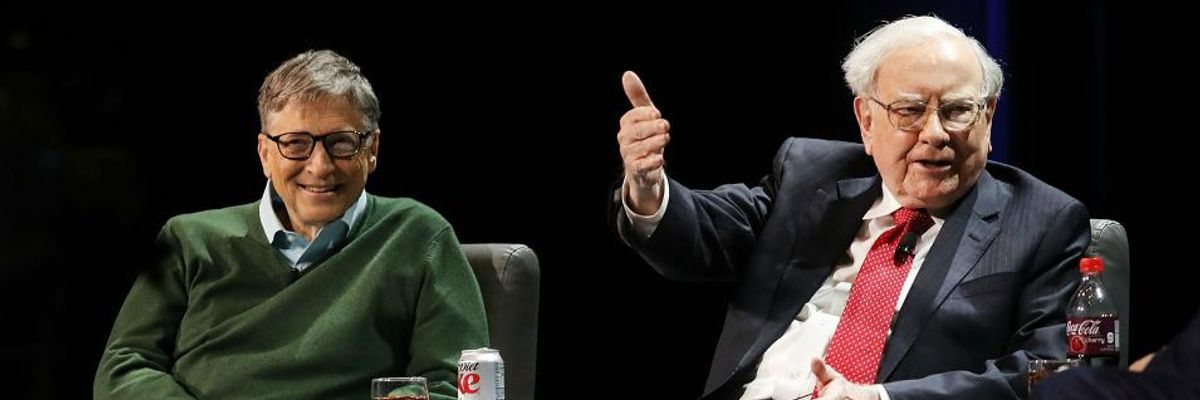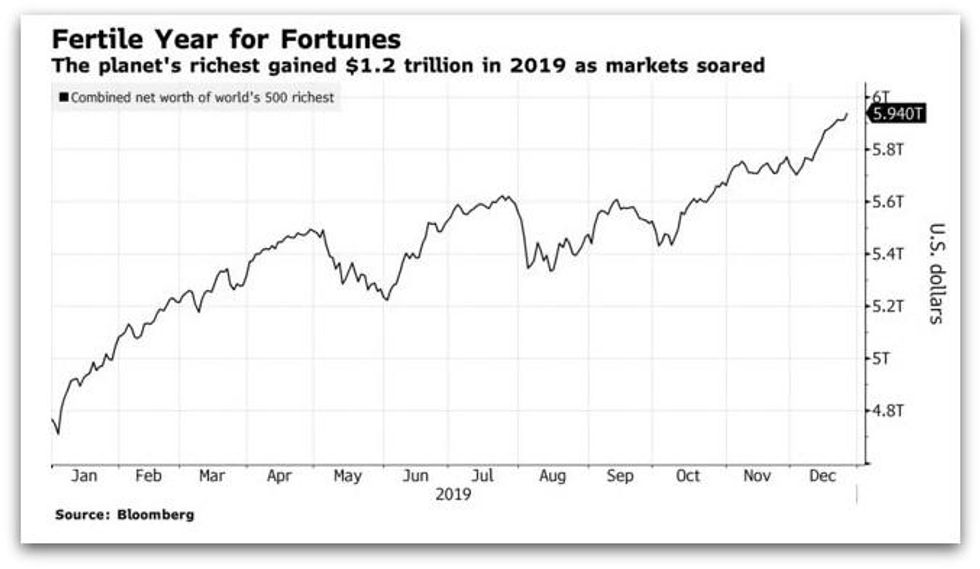

SUBSCRIBE TO OUR FREE NEWSLETTER
Daily news & progressive opinion—funded by the people, not the corporations—delivered straight to your inbox.
5
#000000
#FFFFFF
To donate by check, phone, or other method, see our More Ways to Give page.


Daily news & progressive opinion—funded by the people, not the corporations—delivered straight to your inbox.

Bill Gates and Warren Buffett speak with journalist Charlie Rose at an event organized by Columbia Business School on January 27, 2017 in New York City. (Photo: Spencer Platt/Getty Images)
The 500 richest people in the world, all of whom are billionaires, gained a combined $1.2 trillion in wealth in 2019, further exacerbating inequities that have not been seen since the late 1920s.
That's according to a new Bloomberg analysis published Friday, which found that the planet's 500 richest people saw their collective net worth soar by 25 percent to $5.9 trillion over the last year.
"In the U.S., the richest 0.1 percent control a bigger share of the pie than at any time since 1929," Bloomberg noted. "The 172 American billionaires on the Bloomberg ranking added $500 billion, with Facebook Inc.'s Mark Zuckerberg up $27.3 billion and Microsoft Corp. co-founder Bill Gates [rising] $22.7 billion."
According to the Bloomberg Billionaires Index, eight of the 10 richest people in the world are from the U.S.
Amazon CEO Jeff Bezos lost nearly $9 billion in wealth in 2019, according to Bloomberg, but he will still likely end the year as the richest man in the world with a total net worth of $116 billion.

The analysis comes as 2020 Democratic presidential candidates, particularly Sens. Bernie Sanders (I-Vt.) and Elizabeth Warren (D-Mass.), have made tackling inequality a key component of their policy platforms.
Warren has proposed an annual two percent tax on assets over $50 million and a three percent tax on assets above $1 billion.
Sanders, who has said he does not believe billionaires should exist, is calling for a wealth tax that would slash the fortunes of U.S. billionaires in half over 15 years, according to his campaign.
"A small handful of billionaires should not be able to accumulate more money than they could spend in 10 lifetimes," Sanders said in September, "while millions of Americans are living in poverty and dying because they can't afford healthcare."
Trump and Musk are on an unconstitutional rampage, aiming for virtually every corner of the federal government. These two right-wing billionaires are targeting nurses, scientists, teachers, daycare providers, judges, veterans, air traffic controllers, and nuclear safety inspectors. No one is safe. The food stamps program, Social Security, Medicare, and Medicaid are next. It’s an unprecedented disaster and a five-alarm fire, but there will be a reckoning. The people did not vote for this. The American people do not want this dystopian hellscape that hides behind claims of “efficiency.” Still, in reality, it is all a giveaway to corporate interests and the libertarian dreams of far-right oligarchs like Musk. Common Dreams is playing a vital role by reporting day and night on this orgy of corruption and greed, as well as what everyday people can do to organize and fight back. As a people-powered nonprofit news outlet, we cover issues the corporate media never will, but we can only continue with our readers’ support. |
The 500 richest people in the world, all of whom are billionaires, gained a combined $1.2 trillion in wealth in 2019, further exacerbating inequities that have not been seen since the late 1920s.
That's according to a new Bloomberg analysis published Friday, which found that the planet's 500 richest people saw their collective net worth soar by 25 percent to $5.9 trillion over the last year.
"In the U.S., the richest 0.1 percent control a bigger share of the pie than at any time since 1929," Bloomberg noted. "The 172 American billionaires on the Bloomberg ranking added $500 billion, with Facebook Inc.'s Mark Zuckerberg up $27.3 billion and Microsoft Corp. co-founder Bill Gates [rising] $22.7 billion."
According to the Bloomberg Billionaires Index, eight of the 10 richest people in the world are from the U.S.
Amazon CEO Jeff Bezos lost nearly $9 billion in wealth in 2019, according to Bloomberg, but he will still likely end the year as the richest man in the world with a total net worth of $116 billion.

The analysis comes as 2020 Democratic presidential candidates, particularly Sens. Bernie Sanders (I-Vt.) and Elizabeth Warren (D-Mass.), have made tackling inequality a key component of their policy platforms.
Warren has proposed an annual two percent tax on assets over $50 million and a three percent tax on assets above $1 billion.
Sanders, who has said he does not believe billionaires should exist, is calling for a wealth tax that would slash the fortunes of U.S. billionaires in half over 15 years, according to his campaign.
"A small handful of billionaires should not be able to accumulate more money than they could spend in 10 lifetimes," Sanders said in September, "while millions of Americans are living in poverty and dying because they can't afford healthcare."
The 500 richest people in the world, all of whom are billionaires, gained a combined $1.2 trillion in wealth in 2019, further exacerbating inequities that have not been seen since the late 1920s.
That's according to a new Bloomberg analysis published Friday, which found that the planet's 500 richest people saw their collective net worth soar by 25 percent to $5.9 trillion over the last year.
"In the U.S., the richest 0.1 percent control a bigger share of the pie than at any time since 1929," Bloomberg noted. "The 172 American billionaires on the Bloomberg ranking added $500 billion, with Facebook Inc.'s Mark Zuckerberg up $27.3 billion and Microsoft Corp. co-founder Bill Gates [rising] $22.7 billion."
According to the Bloomberg Billionaires Index, eight of the 10 richest people in the world are from the U.S.
Amazon CEO Jeff Bezos lost nearly $9 billion in wealth in 2019, according to Bloomberg, but he will still likely end the year as the richest man in the world with a total net worth of $116 billion.

The analysis comes as 2020 Democratic presidential candidates, particularly Sens. Bernie Sanders (I-Vt.) and Elizabeth Warren (D-Mass.), have made tackling inequality a key component of their policy platforms.
Warren has proposed an annual two percent tax on assets over $50 million and a three percent tax on assets above $1 billion.
Sanders, who has said he does not believe billionaires should exist, is calling for a wealth tax that would slash the fortunes of U.S. billionaires in half over 15 years, according to his campaign.
"A small handful of billionaires should not be able to accumulate more money than they could spend in 10 lifetimes," Sanders said in September, "while millions of Americans are living in poverty and dying because they can't afford healthcare."